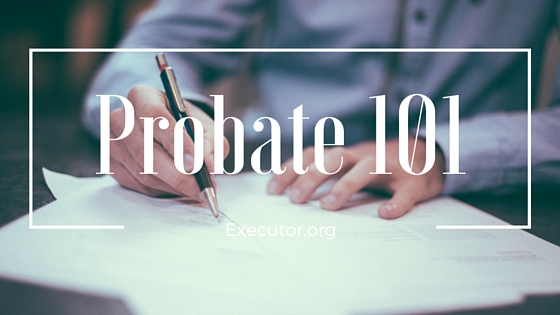
What is Probate? – Executor Duties 101
“What is Probate?” is part of the Executor Duties 101 series, an occasional series by Executor.org that highlights steps in the process of settling an estate.
As new executors, many people ask the basic question, “What is probate?” The entire process can be a bit of a mystery to new executors, so we’ve attempted to simplify the process below.
In its simplest definition, probate is the process of closing a deceased person’s estate. When a person dies, they leave behind debts to be paid and assets to be distributed. If a person dies with a will, the will can leave instructions on how this is to be done. If a person dies without a will, state law will list exactly how to distribute the assets. The person named in the will to take care of these tasks is called an executor. He or she is responsible for the completion of 100+ steps as executor, and managing the probate process is the most complex in most estates. If you’d like to see the 100+ steps involved in settling the estate you’re settling, you can do so by answering a simple set of questions. You can view your plan at no cost.
How does probate work?
When a person dies, their will is filed with the probate court, which is the court that makes sure the deceased assets are distributed following state law. Once the will is filed, the executor will receive instructions from the court on the overarching things that must be done to finish the tasks, such as identifying and protecting assets in the estate. Managing the probate process is just one part of the 100+ step executor process that you can effectively manage by creating and using your custom executor plan on Executor.org. We will create your free custom plan and let you view it at no cost based on your answers to a simple set of questions, so take a (free) look at your duties to become a more informed executor.
How long does probate take?
Overall, the process can take more than nine months. During probate, the will’s validity will be checked; property and assets will be distributed; bills, taxes and other debts will be paid; and finally, the judge will declare the estate closed when there is nothing left to be done.
Who pays for probate?
Because lawyers, accountants and other professionals are involved, you may be concerned how you are going to pay for all of this if you are named as executor. Don’t worry. The estate of the deceased is responsible for all the bills for work done to get through the process. That means professionals such as lawyers and accountants can help and the estate pays for them, not you.
Do I have to go through the probate process?
Not everyone has to go through the probate process to distribute assets in a deceased person’s estate. Some states have laws regarding a threshold value of an estate that provides an exemption or streamlined process if estate assets are below a certain dollar amount. Some people during their life also may establish trusts to avoid the probate process after death. Typically, though, most people’s estates go through the probate process when they die.
Do I still have to go through probate if I don’t have a will?
Yes, even those who die without a will have to go through the probate process. A will names an executor to serve as the point of contact for the distribution of assets. If you die without a will, the probate court judge will name an administrator who will do essentially the same thing as an executor.
Who can help me through the probate process?
Executor.org is a comprehensive resource to help you manage the probate process and the entire executor role. We’ll help you understand your duties, give you a custom checklist, and provide you with a personal, secure Data Vault where you can store all of your information for just $8/month (billed annually). We’ll even connect you with an independent estate attorney who can help you with the process. Start now by creating your custom checklist of executor duties. We’ll create that plan for you for free – and we will do it in less than 5 minutes based on your answers to a list of simple questions. Start now! You can learn about our premium plan that will help simplify your entire executor process by clicking here. It comes with a money back guarantee, so there’s no risk for seeing if Executor.org can help you in this challenging process.
Use our tool to simplify the process and minimize your stress.